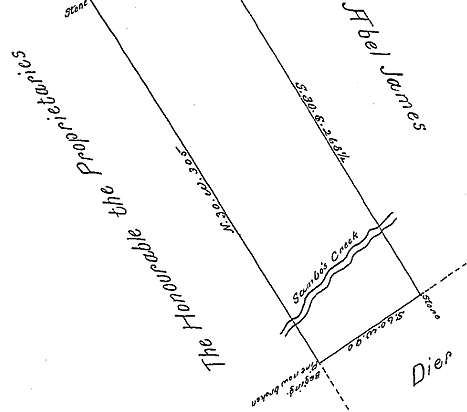| |
| |
|
|
|
| |
| |
THE STORY OF
SAMBO CREEK
As the Sambo name has
long been associated with slaves, one has to
wonder how our local Sambo Creek came by its
name. While area journalists have thus far
tracked the name of this waterway back to an
1806 land sale, the story of the Sambo Creek
goes a bit further back in time.
An earlier survey [D-39-42] conducted in
September 1795 notes "the head waters of Sambo
Brook in Lower Smithfield Township."
Just a wee bit earlier, in June 1795, a tract of
land was surveyed to John Fish [C-47-285] that
was described as "situate on Sambo Creek in
Lower Smithfield township."
Not yet finished, we can finally track down the
earliest survey map [A-58-254] to October 1775
(also surveyed for John Fish), that names and
depicts Sambo's Creek on the map:
Of course, this raises
the question: "if Brodhead's Creek was
named after the Brodheads, and if
McMichael's Creek was named after the
McMichaels, and if Marshall's Creek was
named after Edward Marshall, then
doesn't it make sense that Sambo's Creek
would have been named after someone
commonly known as Sambo"? Perhaps.
According to the Etymology Dictionary,
as early as 1748 the word "sambo" meant
"a person of mixed blood in America,"
and some researchers have pointed to
Pennsylvania's 1726 "Act for the better
Regulation of Negroes" as having been
indicative of the colony's burgeoning
mulatto population. Hence, Sambo might
well have been how folk referred to an
area mulatto. |
|
 |
Still, one other possibility yet remains to be
considered, a linguistic possibility. In
Swedish -- and yes, we have quite a few Swedes
in Pennsylvania -- the suffix "bo" is used to
form the names of residents or inhabitants of
particular places, as in Londonbo ("Londoner").
Accordingly, Sambo might simply refer to
"resident Sam's place". On the other hand, as
this area was settled primarily by the Dutch,
and not by the Swedes, this linguistic
speculation should properly be regarded as a
rather remote possibility.
|
|
| |
|
|
|
|
|
| |
|
|
|
| |
|
|
|
| |
|
|
| |
|
|
|
|